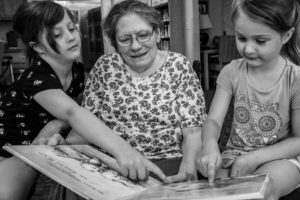I watch a lot of detective shows. I know I’m not alone, because it seems like every time I open Netflix or Amazon Video, I have more options to choose from. Lately, I’ve been noticing that a lot of these series show their main characters—usually police detectives or other crime-solving types—caring for aging family members. I don’t know whether this is a recent trend sparked by increasing public conversations around issues of aging and caregiving or whether I’m simply noticing it more because of where I now work.
In this post, I’ll break down how three shows address what happens when a character’s job responsibilities come up against his or her role as a caregiver. All three of these shows are British crime series. This reflects only my own taste in television; I tend to watch quite a few British shows. None of the shows is current. The oldest started airing over two decades ago and the most recent came to Netflix in 2016.
In this post, I’m primarily interested in how popular culture treats family caregiving. I analyze three series: The BBC’s Silent Witness, Netflix’s The Five, and ITV’s Inspector Lewis. What’s particularly interesting about the three series I analyze here is that aging family members are simply part of the characters’ lives. All of these shows center around crime solving, not around family relationships, but the shows’ creators all choose to spotlight caregiving for aging parents as a central to their main character’s personal lives.
Silent Witness
The BBC’s Silent Witness aired its first season in 1996. It’s still on and aired its twenty-first season in 2018. I’ve only recently started watching it (via Amazon Prime), so I’ve only seen the first two and half seasons. The show focuses on forensic pathologists who help detectives solve crimes by looking closely at remains—and sometimes by getting more involved in investigations than the detectives would like. The first seasons follow Dr. Sam Ryan, a pathologist of Irish descent who moves to Cambridge to work as a professor and police consultant and to be nearer to her sister and aging mother.
Mrs. Ryan has dementia. Sam’s sister, Wyn, lives with her and is her primary caregiver. Ever since their father was killed by an IRA bomb when they were teenagers, the two sisters have had a contentious relationship. Wyn blames Sam for their father’s death and holds her responsible for their mother’s decline. By the last episode of the first season, Mrs. Ryan cannot remember that her husband is dead and often does not recognize Sam. When she starts wandering away from home, Sam decides it’s probably time to find a nursing home where Mrs. Ryan will be safe. Wyn disagrees. Though she is their mother’s primary caregiver and bears most of the brunt of her care, she refuses to seriously consider the idea and fails to turn up for a tour of a possible community. At one point, she tells Sam, “I will not put my mother in some bloody awful home so that you don’t have to look at what you’ve done.”
Silent Witness offers a compelling and realistic portrayal of the conflict between siblings over caring for an aging parent. Wyn wants help, but she doesn’t want help from professionals. She wants help from her sister. The fact that she’s been away for a long time gives Sam some distance and perspective that Wyn doesn’t have, but it also makes it hard for Wyn to take her seriously. At the same time, Sam’s intense job as a medical examiner and teacher (who spends the majority of the episode in question investigating the death of her student’s fiancé) means she doesn’t have time to do much hands-on caregiving. To her, a nursing home is the best solution for everybody. A nice nursing home would keep Mrs. Ryan safe and relieve the burden on Wyn. But to Wyn, whether the home is “bloody awful” or perfectly pleasant is actually immaterial, because the conflict is less about caring for Mrs. Ryan than about getting her sister to live up to her responsibilities.
By the end of season one, the show has set up a real tension between Sam’s career and her caregiving responsibilities. When Sam leaves a family dinner citing a work emergency, Wyn says, “I am an emergency. Mummy is an emergency.” Sam chooses work, believing that the family “emergencies” can be worked out later. The show ends its first season letting viewers, too, believe that this is the case. The question of where Mrs. Ryan will live is not resolved; all we really know is that she has not moved in to a nursing home. But by the first episode of season two, Mrs. Ryan has died. Sam and Wyn never have to come to an agreement, and Sam never has to confront the choice between career and caregiving. Ultimately, Silent Witness acknowledges the conflict but chooses not to resolve it on screen.
The Five
Twenty years after the first season of Silent Witness aired, Netflix’s The Five explored a different kind of family conflict over caregiving and offered a unique twist on the topic. The Five follows a group of friends, one of whom is a police detective, as they try to figure out why the fingerprints of Jesse, a murdered boy, have turned up at a crime scene two decades after he was allegedly killed. Detective Danny Kenwood’s father has Alzheimer’s disease, and one of the opening shots in the first episode shows Danny examining, and then discarding, a brochure for a Memory Support community.
As the series continues, viewers learn more Danny’s father, Ray, and his place in Danny’s household. Ray lives with Danny and his family, and because of Danny’s busy life as a police detective, his wife Jennifer does most of the day-to-day caretaking. We also learn that Ray was the detective who investigated Jesse’s disappearance and murder. When Danny first shows Ray a picture of Jesse and asks him about the case, Ray responds by blowing raspberries. As Danny pursues the case, he learns that Ray altered files relating to the case, and this fact helps confirm that Jesse wasn’t actually dead.
Perhaps because he’s trying to get information related to his work, we see Danny do a lot more hands-on caregiving than, say, Sam of Silent Witness. He feeds his father meals and spends time with him in spite of his busyness. But it’s not just the demands of caregiving that make Ray’s presence in their house difficult for Jennifer. Because of his disease, Ray is frequently disruptive during family time, and it’s difficult for Jennifer and Danny to get time alone together. Danny sees that his wife is struggling, but he’s devoted to his father, to whom he looks up both personally and professionally.
It’s not until Jennifer leaves and threatens not to return that Danny sees just how much of a toll his father’s needs have taken on his marriage. When he realizes that he might have to choose between his marriage and having his father in his house, Danny decides to move his father into a specialized Memory Support Community. This is a happy ending for the Kenwood family. As Danny tells Jennifer about his decision, he promises to take the family on vacation and to prioritize their needs over work as well as his father. Unlike Sam and Wyn of Silent Witness, Danny of The Five does have to make a decision, and that decision plays out as a resolution.
Inspector Lewis
In the eighth and final season of ITV’s Inspector Lewis (2016), however, we see that moving a parent with dementia into a Memory Support community does not always mark the end of family conflict over caregiving responsibilities. Over the course of its eight seasons, Inspector Lewis subtly but definitely emphasizes the personal costs of detectives’ jobs. The title character misses milestones in his children’s and grandchildren’s lives, and his partner, Detective Sargent—and by the eighth season, Inspector—Hathaway at several points has to choose between his personal and professional loyalties.
In the final season, Hathaway’s sister, Nell, decides that the time has come to move their father into a Memory Support Community. After an early visit goes poorly, Hathaway refuses to engage with his father. Throughout the rest of the season’s first episode, Nell repeatedly leaves Hathaway messages reminding him of his responsibilities. Viewers get the sense that Hathaway hasn’t been a particularly involved son. This is the first we’ve heard of his father’s dementia, and Nell says, “It’s easier to pretend nothing’s wrong, isn’t it? And leave it to me to pick up the pieces yet again.” There’s a lot of back-and-forth between Hathaway and Nell, all with the implication that Hathaway has failed his family responsibilities because he prioritizes work.
The senior Mr. Hathaway goes to live in the Memory Support community because caring for him is too much for Nell and Hathaway doesn’t help, but that’s not the end of the conflict. In fact, it’s only the beginning. Nell wants Hathaway to be involved and visit, and he resists. Finding the right community for a loved one can ease the day-to-day burdens of caregiving, but family members don’t stop being family members just because they don’t live with you anymore. As The Five suggests, the right community can make a big difference in the lives of caregivers. But Inspector Lewis reminds us that how to divide the various responsibilities of caring for an aging family member is an ongoing concern.
Time is hardly the only reason Hathaway avoids seeing his father. In his first visit, the older Mr. Hathaway doesn’t recognize his son and doesn’t remember that his wife is dead. Hathaway struggles to accept that he can no longer interact with his father in the ways that he used to, over books and intellectual pursuits. Nell’s exasperation comes as much from her brother’s refusal to accept their changed parent as from the burden he places on her. Eventually, with Lewis’s help, Hathaway reconnects with his father over fishing. Mr. Hathaway’s dementia is not going to get better, and once he accepts that, Hathaway finds a way to enjoy his company. His acceptance of his father’s condition also helps him reconcile with Nell.
Taken together, Silent Witness, The Five, and Inspector Lewis portray a range of possible responses to family conflict over caregiving. The ways the three shows resolve (or not) the conflicts in question show that careers and caregiving can coexist. Some time in the twenty years between the first season of Silent Witness and the final season of Inspector Lewis, the subject of caring for aging family members came to the forefront of public discourse. Also during that time, options for dementia care increased in both range and reputation, so Hathaway and Nell have choices that Sam and Wyn don’t. Overall, these three shows offer a compelling narrative of the conflict between career and caregiving—and the way that conflict both has and hasn’t changed over time.


 Susan Allison loves reading to children. Her passion for helping those younger than herself goes all the way back to own childhood, when she helped her grandmother in the church nursery. Susan grew up in Lawrenceville, Illinois, where her parents first ran a clothing store and later managed an apartment building. Her first work experience included helping her father with his property management duties.
Susan Allison loves reading to children. Her passion for helping those younger than herself goes all the way back to own childhood, when she helped her grandmother in the church nursery. Susan grew up in Lawrenceville, Illinois, where her parents first ran a clothing store and later managed an apartment building. Her first work experience included helping her father with his property management duties. When I walk down the hallway between Buffalo Hill Terrace and The Villas, where The Passions Project photos now hang, I am struck by one particular quality all the photos share. Each photo shows a resident finding joy, often in an activity they’ve done for a large part of their life.
When I walk down the hallway between Buffalo Hill Terrace and The Villas, where The Passions Project photos now hang, I am struck by one particular quality all the photos share. Each photo shows a resident finding joy, often in an activity they’ve done for a large part of their life.